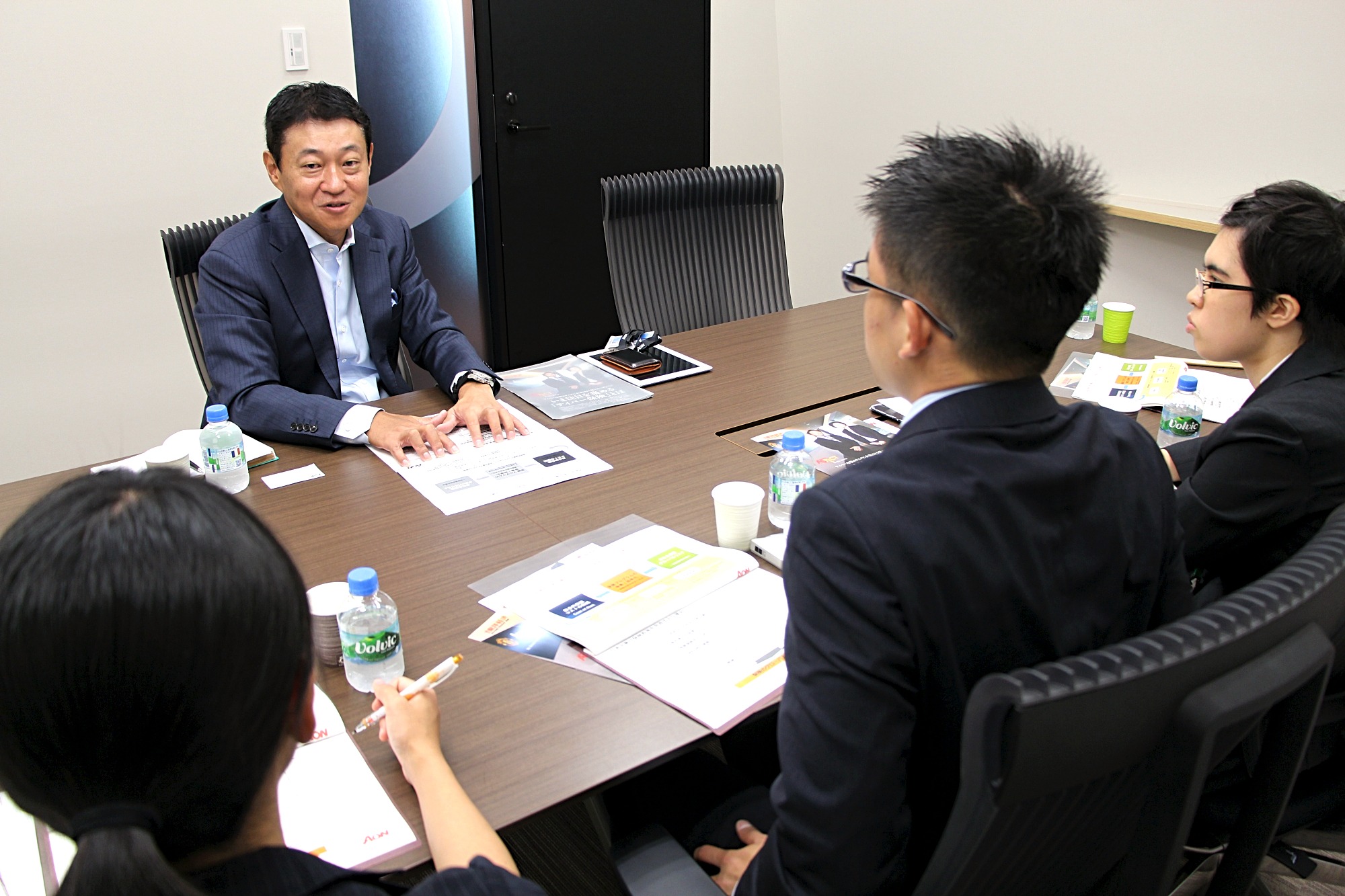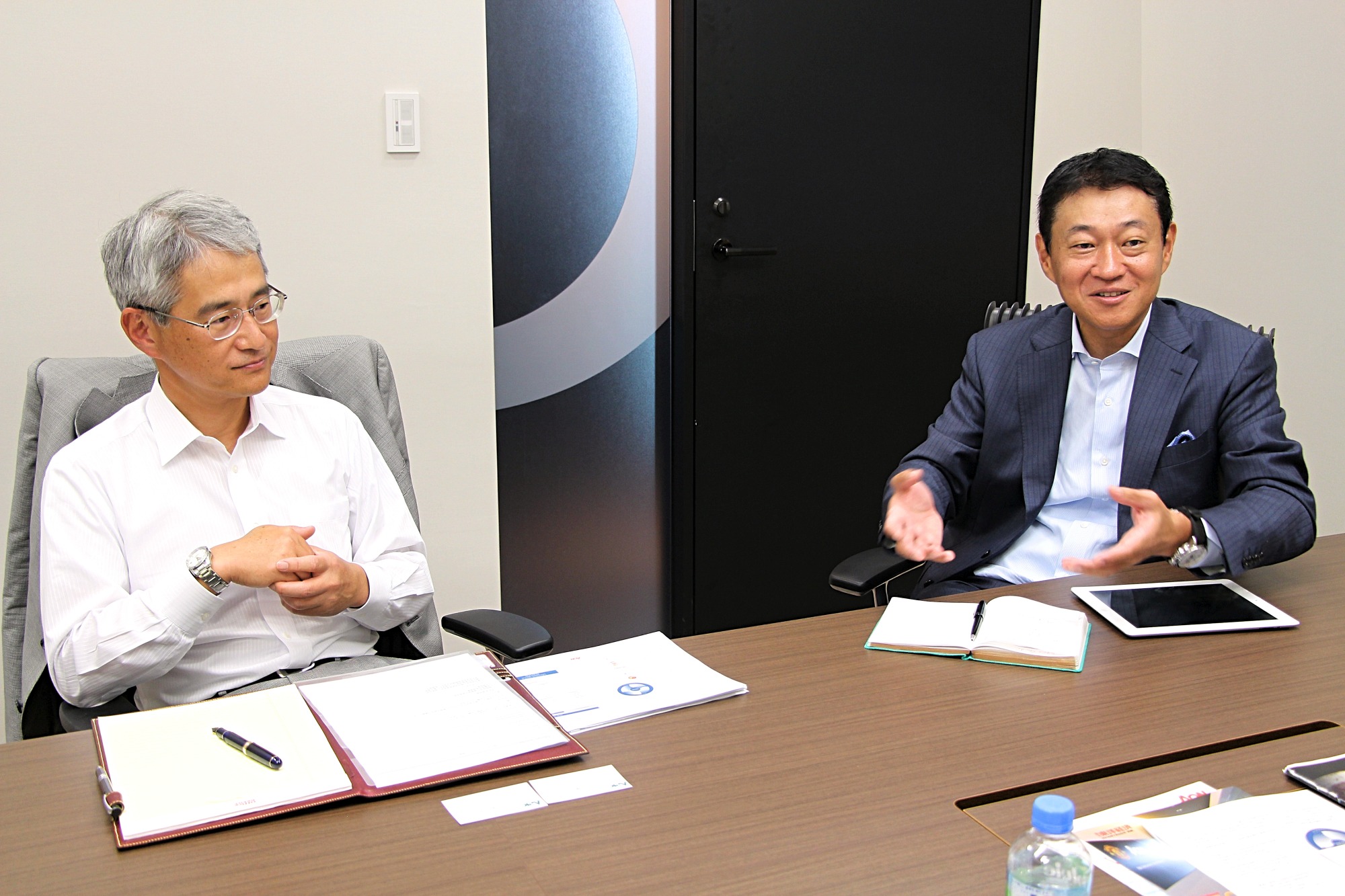Interview: Mr. Yamamoto, President & CEO of Aon Japan Ltd.

Sophia University puts emphasis on global human resources development today. On 24 August 2016, Sophia internship students interviewed Mr. Tatsuya YAMAMOTO, President & CEO of Aon Japan Ltd. and Mr. Katsuya Tanimizu, CEO of Aon Benfield Japan, both of which are companies operating on a global basis. Aon group was founded in 1919 in Chicago selling accident insurance and expanded its business globally and is now providing in over 120 countries. Aon is such a multinational corporation and is even leading globalization of companies. There are many cases where excellent ideas beyond imagination have appeared and have been materialized in the business of AON, which keeps pace with other companies being active in the front lines of business in the world. Internship students asked Mr. Yamamoto and Mr. Tanimizu about (1) “the changes” needed in in Japan the future, (2) true meaning of being successful globally, and (3) what is called for young people.
Question: What is Aon conscious of in the front line of “globalization”?
Answer: With the globalization of companies, the scope and the content of business have been diversified. Companies that create innovative technologies are professional, but they are not professional in terms of Risk Management. Therefore, we work with clients together to mitigate risks. There is no business with zero percent risk. We always try to make the risks closer to zero.
For example, the people who work in the space industry know far more than us, however, when it comes to the potential risks, we are experts. So, we can continue to challenge new things by cooperating with each other. I think we live in the global society today where each of experts know their own professional domains, and help with each other outside of their own domains. Communicating with each other will make the world better, I suppose.
Question: Is there any difference in understanding of “risks” between Japan and Europe /America?
Answer: You are right. I imagine I will start a new job with 1 million yen that I have saved. At the moment when I decided to use this 1 million yen, a risk will occur. Perhaps I could not sell any products I made. But if the business is successful, a profit will be expected. Now you will understand there are two kinds of interpretation of “risk”. One is “a risk is something to avoid”. This is Japanese way of thinking. In Japan, we try to choose the safe way to the extent possible. The other is “a risk is something to take a chance”. To interpret like this, we will try to reduce a possibility of risks even a little. By managing risks without avoiding them, we can transform risks into opportunities. This is the western way of thinking and therefore they can expand the business further.
Question: How will Aon support Japanese companies facing an inevitable phenomenon of globalization?
Answer: It’s not easy to answer. If asked whether Japanese companies can expand their business globally within 5 to 10 years, I would say “no”. There is no right answer. However, if companies are provided stories that will enable them to shift to new lines of business avoiding Japanese unique culture of “shame” when they find new and efficient ways, then the world will change with speed. For example, if there are new guidelines set by the government or the industrial circle, industry as a whole can change without blaming anyone. I also think that instead of accusing companies and people who are behind, we should encourage them to make new routes. By doing that, we always consider the ways in which each company can change easily.
Question: What do you think is necessary for Japan to advance globalization?
Answer: Absolutely, Japan has many good points. There are no other comfortable and safe countries than Japan. The average of work of Japanese job is very high, I suppose. The professional consciousness of the staff who work at restaurants or sport shops are also very high. Japanese “service” is highly appreciated in the world. However, although we have such strengths, we are poor in expressing it. That is, “a language barrier”. Japanese who were born in Japan, grown up in Japan, employed in Japan, and exposed in Japanese culture, can’t be accepted internationally even if they are accepted in Japan. Although there are some quality human resources, this is “a dearth of talent”. Even workers at foreign firms like us notice this barrier. So, we are looking forward to a young generation like you. If young people can debate both in English and in Japanese, and appeal Japanese "goodness" to the world, I think that the change of Japanese companies will speed up.

(Mr. Tanimizu, CEO of Aon Benfield Japan Ltd. (left) and Mr. Yamamoto, President & CEO of Aon Japan Ltd. (right))
WHAT'S NEW
- 2025.8.28 UPDATE
PROJECTS
"Barbados A Walk Through History Part 16"
- 2025.5.15 UPDATE
EVENTS
"417th Lecture Meeting Regarding Global Issues"
- 2025.4.17 UPDATE
EVENTS
"416th Lecture Meeting Regarding Global Issues"
- 2025.3.13 UPDATE
EVENTS
"415th Lecture Meeting Regarding Global Issues"
- 2025.2.20 UPDATE
EVENTS
"414th Lecture Meeting Regarding Global Issues"
- 2025.2.12 UPDATE
PROJECTS
"Barbados A Walk Through History Part 15"
- 2025.1.16 UPDATE
EVENTS
"413th Lecture Meeting Regarding Global Issues"
- 2024.12.19 UPDATE
EVENTS
"412th Lecture Meeting Regarding Global Issues"
- 2024.12.4 UPDATE
PROJECTS
"Barbados A Walk Through History Part 14"




